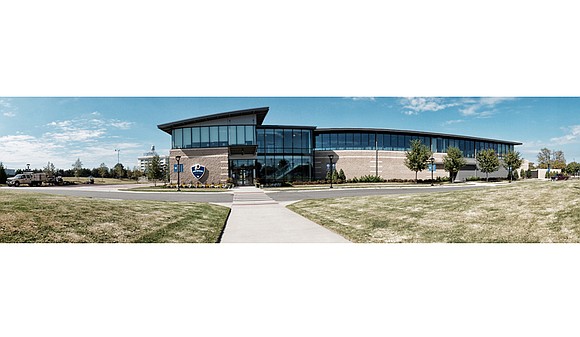Punked
Jeremy M. Lazarus | 5/26/2018, 9:49 p.m.
Unrealistic assumptions and overly rosy income forecasts.
Those were among the shaky financial footings on which the Leigh Street training camp for the Washington NFL team was built, according a new report from the office of City Auditor Louis G. Lassiter.
And six football seasons after the training camp opened, the financial results have unsurprisingly failed to live up to the financial expectations that former Mayor Dwight C. Jones and his staff used to sell the development and associated projects to Richmond City Council and the public, the 23-page report found.
According to the report issued May 15, the camp, which includes the building at 2401 W. Leigh St. that is leased most of the year for medical office space, has generated $4 million to $7 million less total income than forecasts anticipated.
Among the problems: Major elements of the three-part development have yet to be accomplished, including the renovation of the former Westhampton School building in the West End and the construction of a new medical office building in the East End near Bon Secours Richmond Community Hospital.
In addition, the second floor of the Leigh Street training camp building has never been fully leased, resulting in far less rental income than originally projected.
Those are some of the reasons, the report found, that the training camp development has generated only $1.5 million to repay the $10 million the city invested to build the camp in a partnership with Bon Secours.
Bon Secours contributed about $3.3 million to gain naming rights to the training camp, but that money largely ended up being absorbed by the building rather than being used to repay a portion of the city’s investment.
The report found another reason for the repayment shortfall is the more than $1 million that the city’s Economic Development Authority has paid to the football team since 2014 as an inducement to come to Richmond, an expense that was not anticipated in the 2012 financial forecasts.
The EDA and the city agreed to the inducement payments after City Council turned the project’s ownership and management over to the EDA as Mayor Jones requested.
The report has been released at a time when current Mayor Levar M. Stoney and the team are discussing a possible extension of the team’s use of the camp for summer training. The team’s eight-year agreement is set to expire after the 2020 training camp, and a new agreement is supposed to be in place between the EDA and the team by July 1 if the relationship is to continue.
Mayor Stoney has indicated he would like to extend the team’s use of the camp, but on better terms, including ending any requirement for the city or EDA to pay the team for training in Richmond.
City Council called on the auditor to conduct the study of finances after council members reluctantly voted in early March to allow the city to refinance the remaining $8.5 million debt on the camp so it could be paid off over 15 years. The EDA indicated that it could not guarantee the debt would be covered by the camp’s income.
Instead of the camp generating income to cover the debt, the debt is now an obligation of city taxpayers, who must pay $750,000 per year for 15 years, or a total of $11.25 million, including interest.
“This report does not reveal anything new, but it does confirm what we have known or suspected,” said Councilman Parker C. Agelasto, who has been one of the harshest council critics of the deal that brought the team to Richmond. He has spent the last two years pressing city development officials to provide updated projections.
Mr. Agelasto said dismay about this money-losing project has led council to require Lee Downey, the city’s chief development officer, and the city’s economic development staff to provide updates every three months for all development projects “in which the city or the EDA is involved.”
The auditor’s report is not a complete look at the training camp and the associated projects that were supposed to be part of the deal.
“The objective of this audit was to evaluate the overall compliance and performance of the contracts and the associated agreements,” the report stated.
The report noted, though, “This was not an economic impact analysis,” which Mr. Downey has commissioned Virginia Commonwealth University to undertake to look at the effect the camp has had on city sales, meals and businesses taxes.
Earlier looks at collections of taxes from restaurants and other businesses found little impact.
And no evidence has emerged that the camp was a catalyst for the boom in business and residential development in nearby Scott’s Addition. Developers repeatedly have said the training camp did not figure into their calculations about investing in that section of Richmond.
Despite the disappointing financial results, the auditor involved in generating the report “determined that the terms and conditions were in alignment with what was approved by the City Council, with minimal exceptions.”
Based on the findings, the report recommends that Mr. Downey and his staff update the financial projections for City Council “to determine the long-term impacts” and to provide “updated assumptions regarding the developments in the East End and Westhampton.”
Also, the report also recommends that Mr. Downey work with the EDA and Bon Secours to set “reasonable timeframes for the development of those properties.”
The report also called on Mr. Downey to work with the EDA and the city administration to better define and document the process for approving the payments of cash and in-kind services to the team and to “make adjustments in future payments” to the team.








